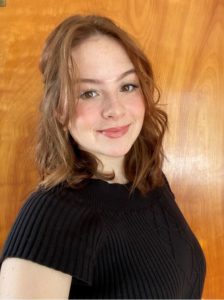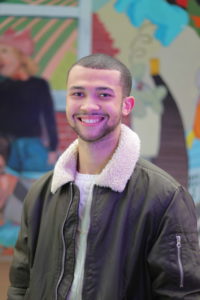 How would you describe your time as an English or Film Studies major at MSU?
How would you describe your time as an English or Film Studies major at MSU?
My time as an English major could be summarized as a period of immense personal growth. The beauty of the English major is that it is vast and encompasses many areas of study, which explains why I felt drawn to it. By studying English, I was able to explore gender, race, psychology, history, politics, education, religion, film, theatre, and so on. My major allowed me the freedom to learn as much as I could about the thousand things in life that interest me. This comprehensive learning experience helped me grow as a scholar, a professional, and, most importantly, as a person.
Which classes, instructors, or experiences particularly stand out for you and why? How did they prepare you for the next phase of your life?
The days when I would walk into an English class and see all the desks forming a big circle in the center of the room were my favorite days, filled with intense discussions over whatever life-altering book we were reading that week. I miss getting to hear the transformative thoughts of my classmates and debating over a particularly interesting plotline. These in-class conversations with my peers are some of the most important experiences I had in college. I was able to think beyond myself and learn from the perspective of others.
Additionally, my education courses will always stand out in my mind as catalyst moments in my learning experience. Although I found my path separate from education, the things I learned in classes with Professor Emery Petchauer and Professor Lamar Johnson have altered the way I think about learning, education, relationships, society, and life in general. Understanding the education system has helped me understand the function of society. The things I learned in education courses have equipped me with knowledge from the classroom that I can translate into any professional setting.
Lastly, It would be wrong if I didn’t mention all of the theater and music courses I have taken throughout the years at MSU, which brought me so much joy and helped me build my confidence to discover where my passions lie.
What advice would you give future English or Film Studies majors, based on your experiences in the department?
I would advise incoming English majors to go for what you really want! I spent so much time convincing myself that I wasn’t good enough to pursue a certain career path, that I wasted the opportunity to improve myself so I could actually have that dream career. Anything is achievable if you are willing to work for it, and with the resources provided here at MSU, you can reach the stars if that’s what you desire!
What coursework-related projects were/are you working on this year, and what interests or excites you about them? (capstone courses, honors thesis, independent studies, etc.)
My ENG 400 writing intensive was in tandem with Professor Julian Chambliss’ course on literature and visual culture. I spent the Fall semester of this year conducting interviews with two different Afrofuturist comic creators, where I was able to learn so much about not only their individual creative processes and career paths, but their knowledge of Afrofuturism. This was an opportunity that allowed me the freedom to facilitate an interview experience, transcribe it, and then connect the dots from my interviews to other oral history accounts from “Voices of the Black Imaginary” in a paper that explored how various Black creators define the term Afrofuturism today. This was very special to me because I have spent so much of my experience at MSU studying critical race theory and pedagogy, and Afrofuturism was a term that I had yet to explore. Getting to talk to two successful Black comic creators was a privilege that I learned so much from and inspired me to continue to work towards my own creative goals.
What are your hopes and aspirations, post-graduation?
I have so many aspirations, you would think I was crazy if I were to list them all here, so I will keep it brief. I aspire to be present. I aspire to go many places in life, meet many people, and experience many things. I aspire to make a real change in others’ lives, while living my own as authentically as possible. Most of all, I aspire to not let the opinions and pressures of society influence the way I live my life.
I hope to work in some way in the entertainment industry, whether that be managing music tours, being a background singer, or running a theatre company, but I am not set in stone on any one career path. I want to do it all.
If you’re interested in doing so, please reflect a bit on the strange experience of being a graduating senior during COVID. What resources have been most useful to you in navigating this unprecedented situation?
Oh, COVID… the stealer of joy and giver of life-lessons. My experience living in this “apocalyptic dreamscape,” as one of my professors calls it, changes day by day. Sometimes I am fearful of life after graduation and heading out into this broken world, other times I am filled with the hope of potential that I now have the freedom to truly do whatever I want. I think that this is probably a common thought that all graduates have, COVID world or not, but I have found the pandemic to add just a little stress onto the experience… or a lot. I am sad that I had to miss out on so many classic MSU experiences that we would have had in a normal year, but I am grateful for the time this pandemic has allowed for me to grow. Can we shout out Zoom really quick? That was the most useful thing to me in this pandemic. Also escaping reality through reading actual, physical books. Sometimes, you just need to smell the pages and float away into literary dreamland.
 How would you describe your time as an English or Film Studies major at MSU?
How would you describe your time as an English or Film Studies major at MSU?